Fall of Singapore - Letters of Sergeant Jack Warren Corey part 13
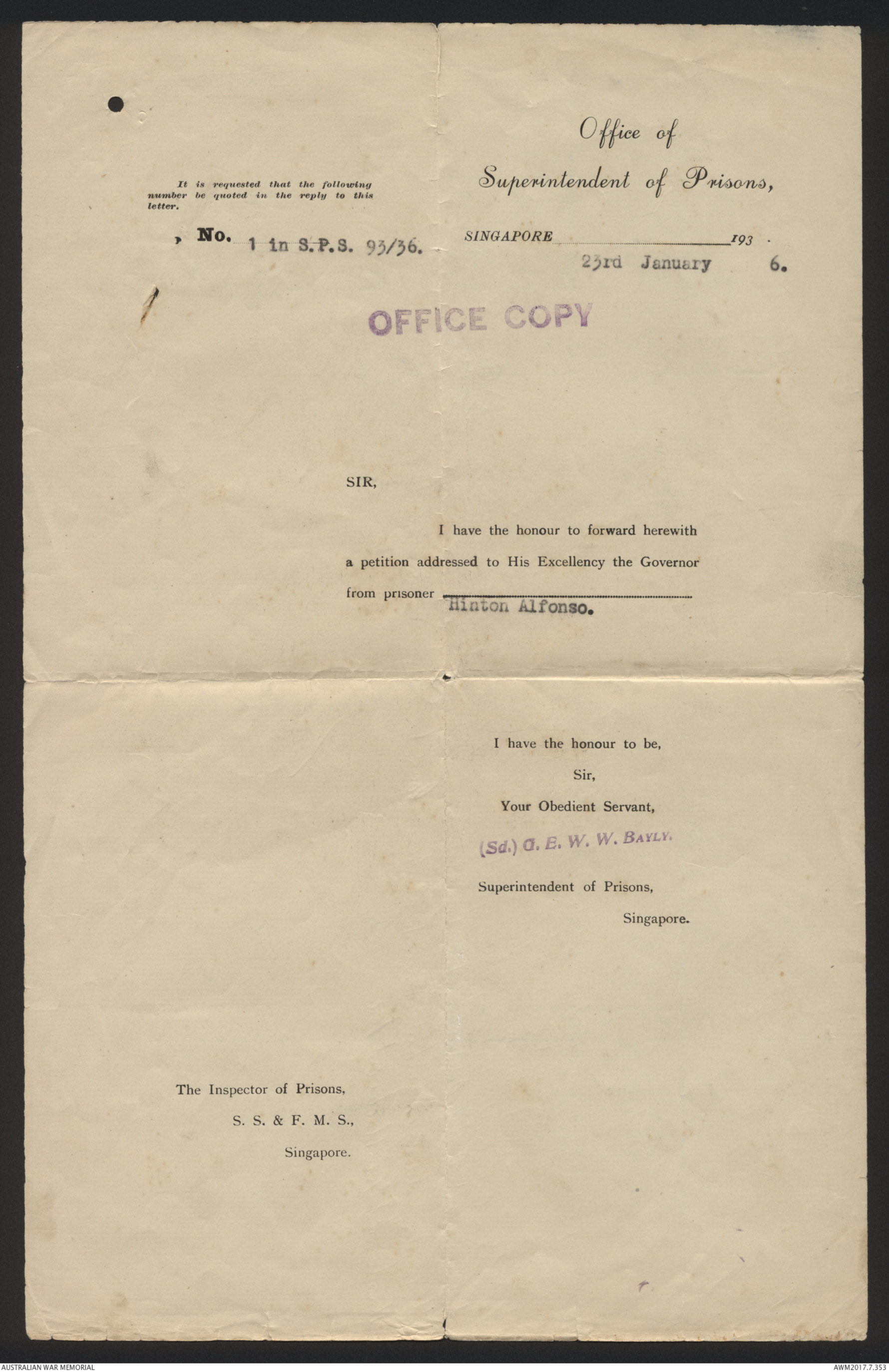
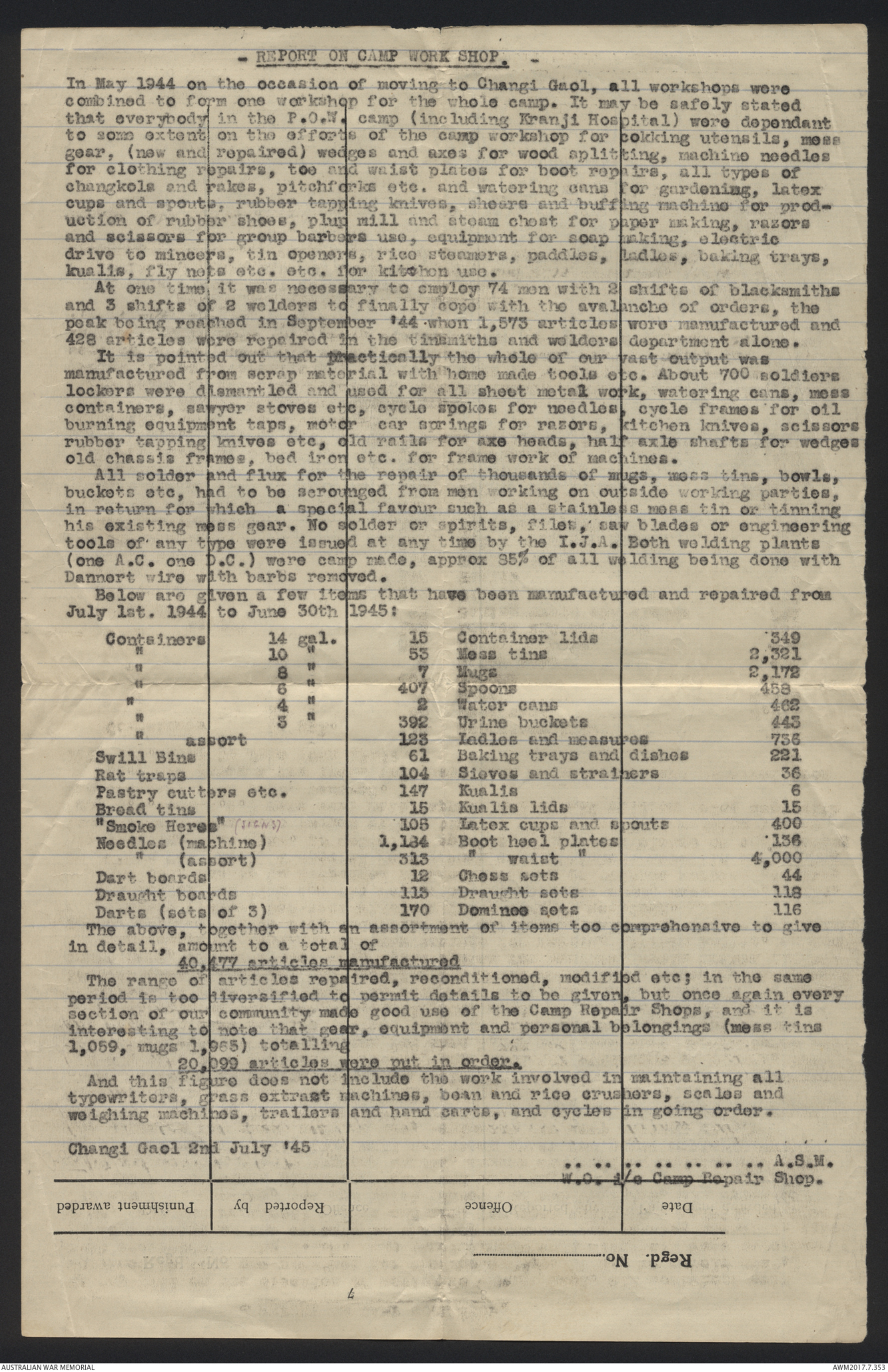
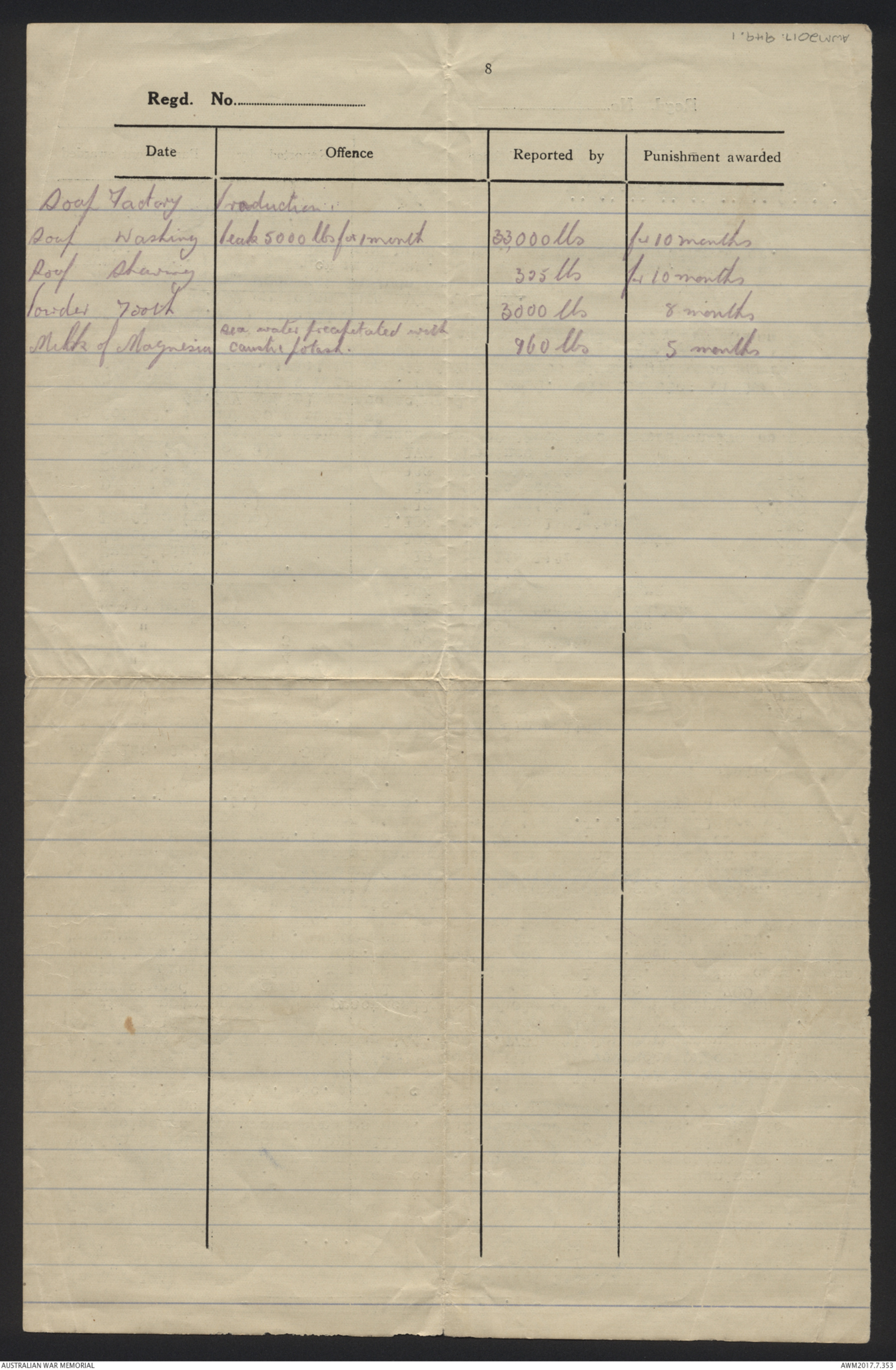
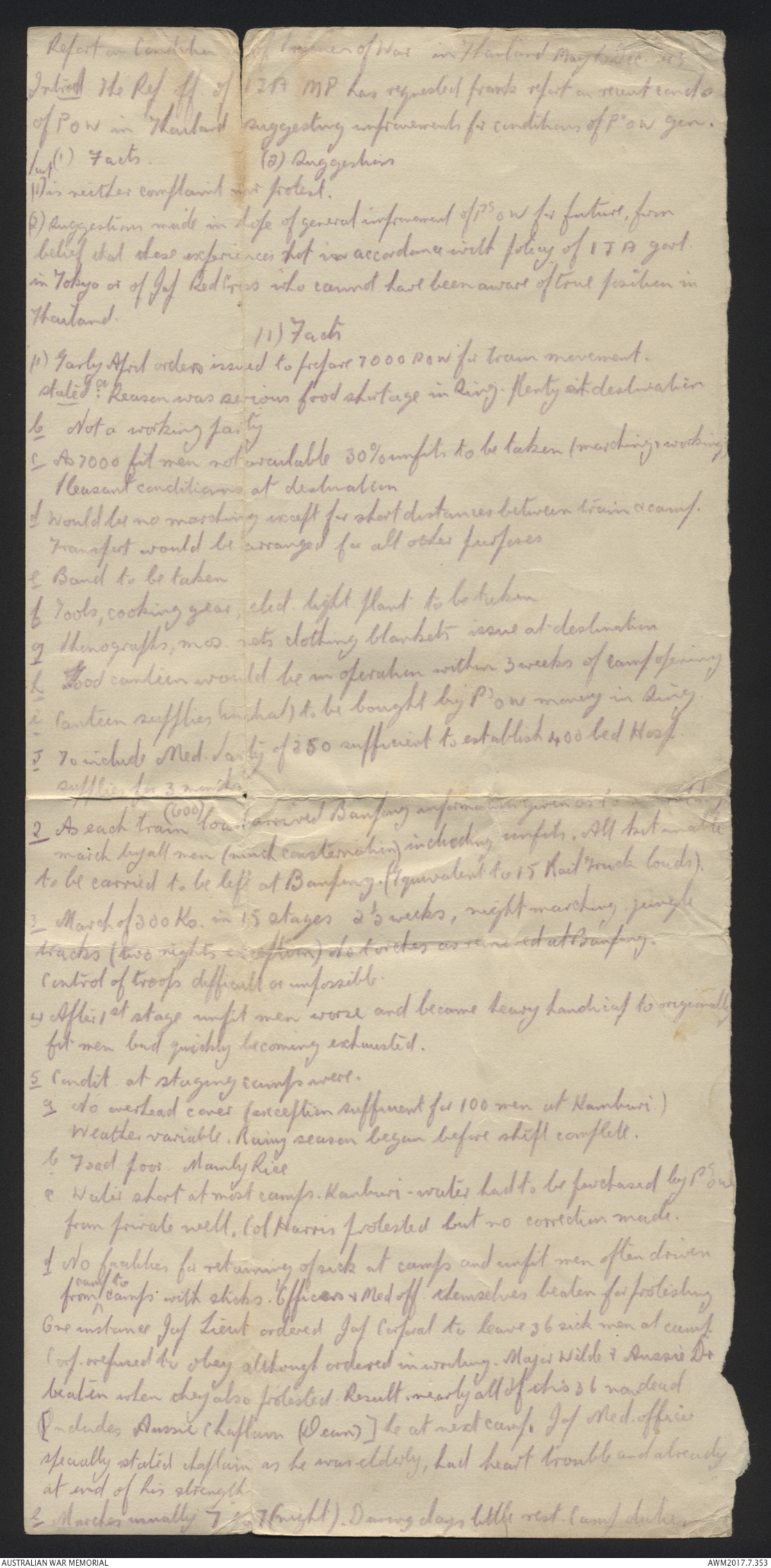
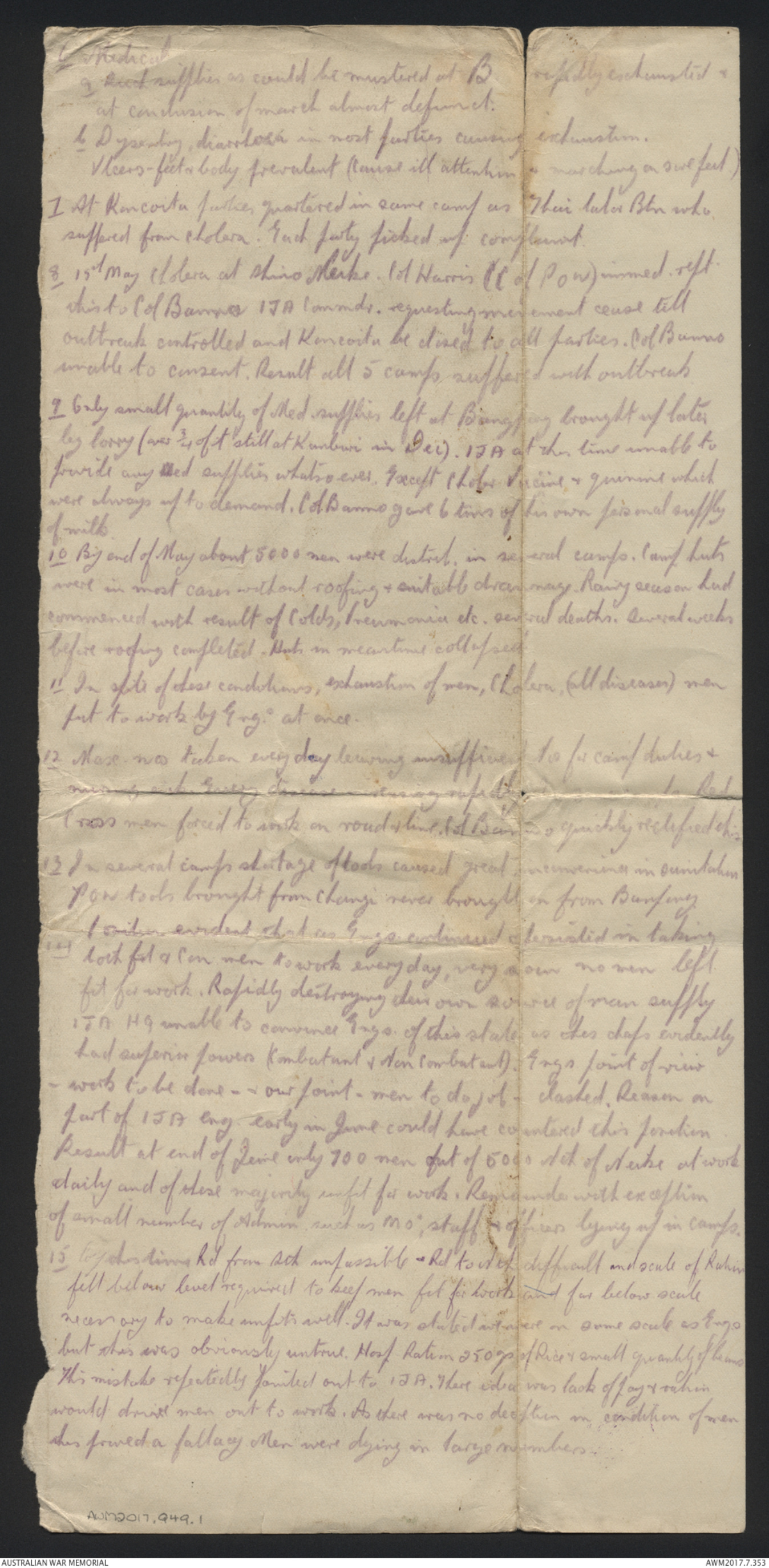
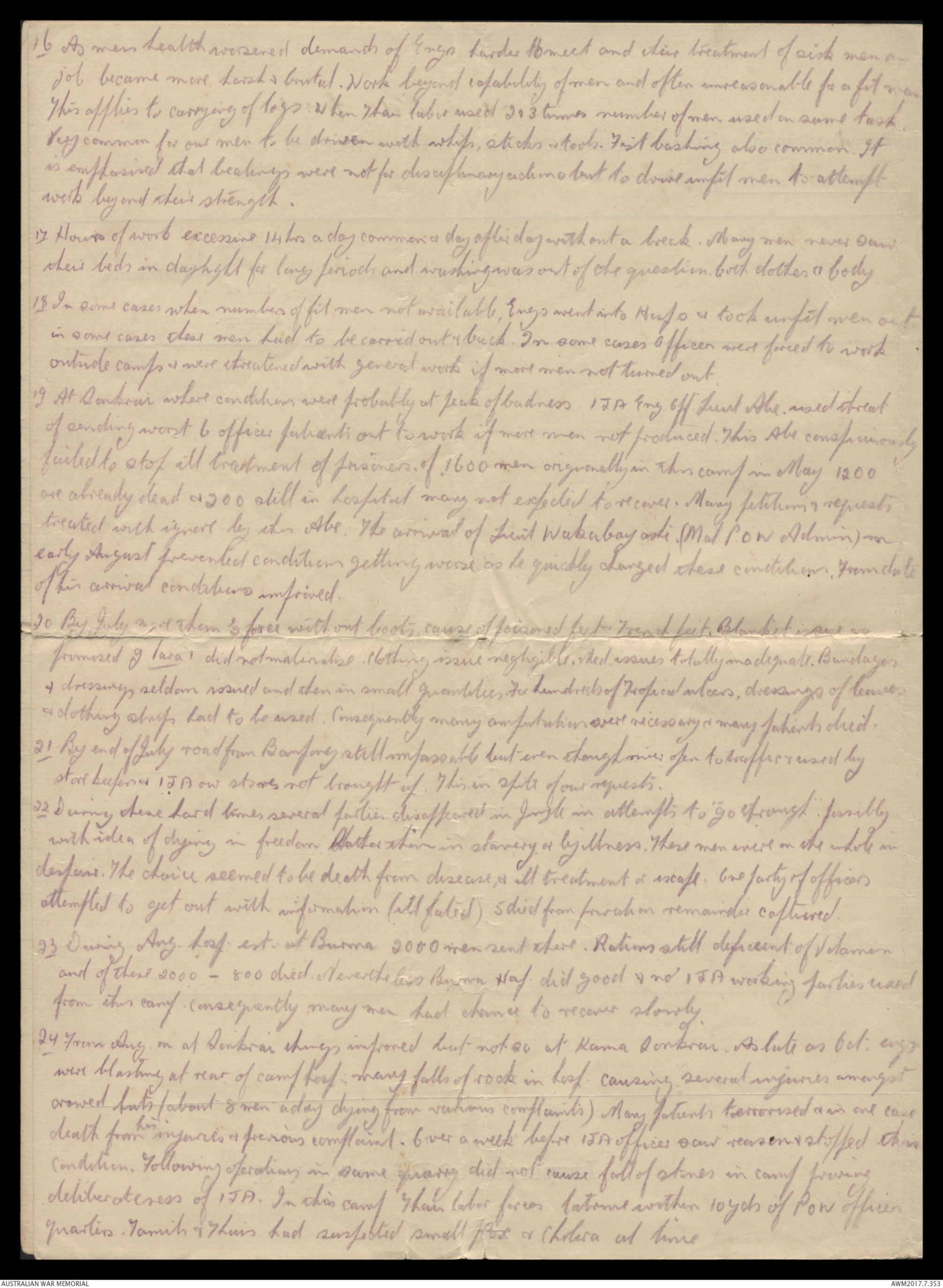
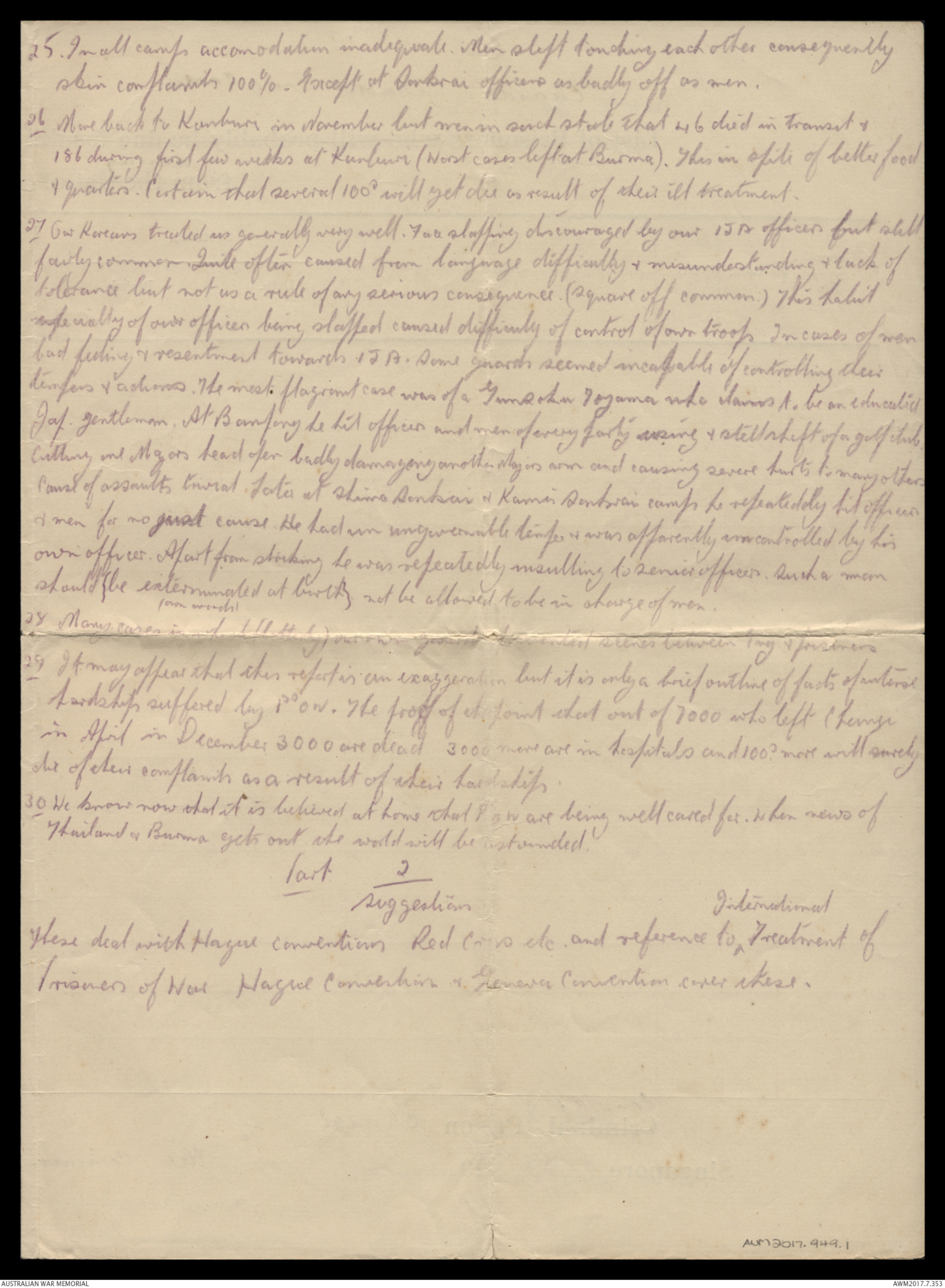
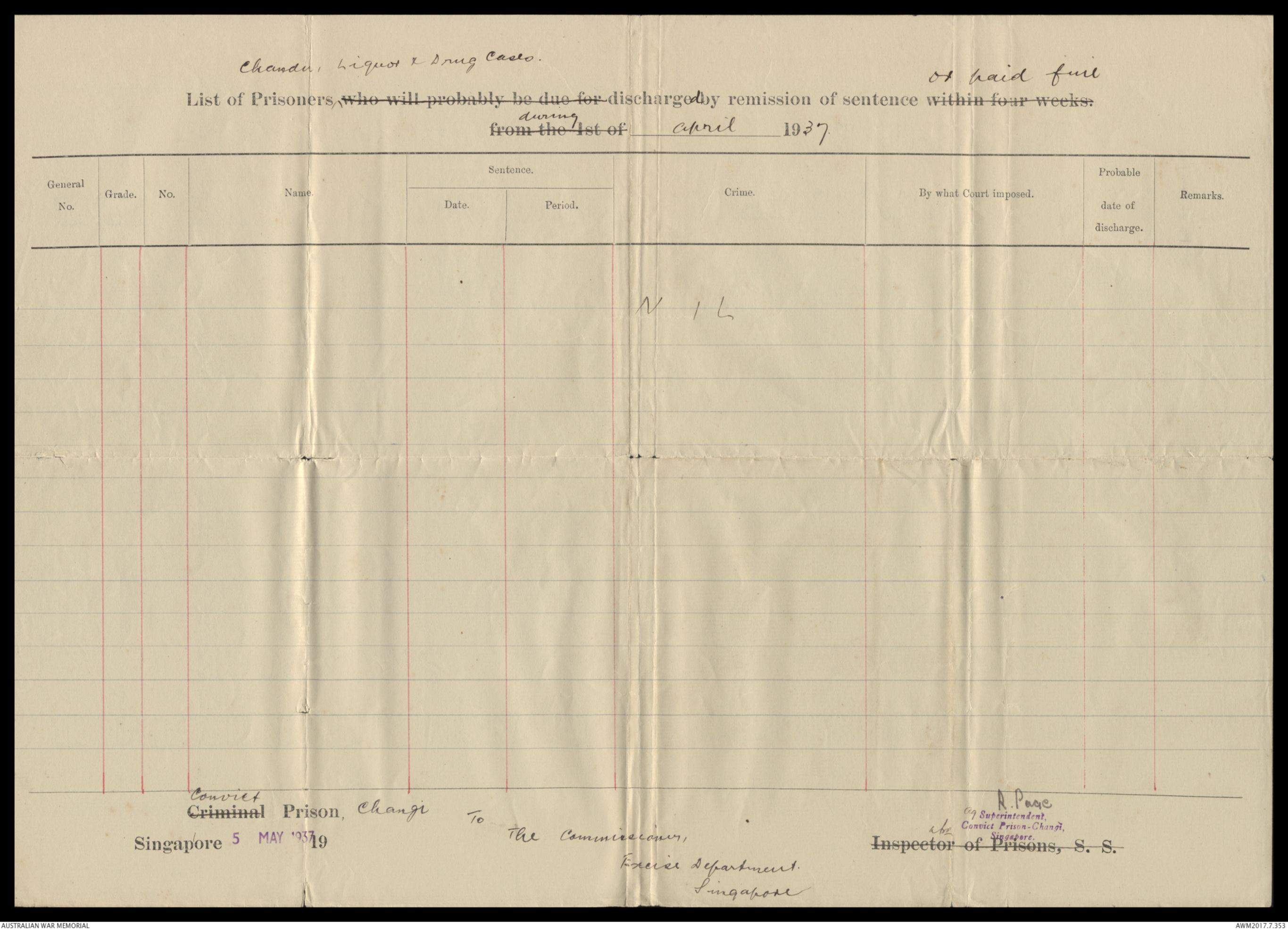
Office of
Superintendent of Prisons,
SINGAPORE 23rd January 1936.
It is requested that the following
number be quoted in the reply to this
letter.
No. 1 in S.P.S. 93/36.
OFFICE COPY
SIR,
I have the honour to forward herewith
a petition addressed to His Excellency the Governor
from prisoner Hinton Alfonso.
I have the honour to be,
Sir,
Your Obedient Servant,
(Sd.) G.E.W. W. BAYLY.
Superintendent of Prisons,
Singapore.
The Inspector of Prisons,
S. S. & F. M. S.,
Singapore.
- REPORT ON CAMP WORK SHOP. -
In May 1944 on the occasion of moving to Changi Gaol, all workshops were
combined to form one workshop for the whole camp. It may be safely stated
that everybody in the P.O.W. Camp (including Kranji Hospital) were dependant
to some extent on the efforts of the camp workshop for cokking utensils, mess
gear, (new and repaired) wedges and axes for wood splitting, machine needles
for clothing repairs, toe and waist plates for boot repairs, all types of
changkols and rakes, pitchforks etc. and watering cans for gardening, latex
cups and spouts, rubber tapping knives, shears and buffing machine for production
of rubber shoes, plup mill and steam chest for paper making, razors
and scissors for group barbers use, equipment for soap making, electric
drive to mincers, tin openers, rice steamers, paddles, ladles, baking trays,
kualis, fly nets etc. etc. for kitchen use.
At one time, it was necessary to employ 74 men with 2 shifts of blacksmiths
and 3 shifts of 2 welders to finally cope with the avalanche of orders, the
peak being reached in September '44 when 1,573 articles were manufactured and
428 articles were repaired in the tinsmiths and welders department alone.
It is pointed out that practically the whole of our vast output was
manufactured from scrap material with home made tools etc. About 700 soldiers
lockers were dismantled and used for all sheet metal work, watering cans, mess
containers, sawyer stoves etc, cycle spokes for needles, cycle frames for oil
burning equipment taps, motor car springs for razors, kitchen knives, scissors
rubber tapping knives etc, old rails for axe heads, half axle shafts for wedges
old chassis frames, bed iron etc. for frame work of machines.
All solder and flux for the repair of thousands of mugs, mess tins, bowls,
buckets etc, had to be scrounged from men working on outside working parties,
in return for which a special favour such as a stainless mess tin or tinning
his existing mess gear. No solder or spirits, files, saw blades or engineering
tools of any these were issued at any time by the I.J.A. Both welding plants
(one A.C. one D.C.) were camp made, approx 85% of all welding being done with
Dannert wire with barbs removed.
Below are given a few items that have been manufactured and repaired from
July 1st. 1944 to June 30th 1945:
| Containers | 14 gal. | 15 | Container lids | 349 |
| " | 10 " | 53 | Mess tins | 2,321 |
| " | 8 " | 7 | Mugs | 2,172 |
| " | 6 " | 407 | Spoons | 458 |
| " | 4 " | 2 | Water cans | 462 |
| " | 3 " | 392 | Urine buckets | 443 |
| " assort | 123 | Ladles and measures | 736 | |
| Swill Bins | 61 | Baking trays and dishes | 221 | |
| Rat traps | 104 | Sieves and strainers | 36 | |
| Pastry cutters etc. | 147 | Kualis | 6 | |
| Bread tins | 15 | Kualis lids | 15 | |
| "Smoke Heres" (SIGNS) | 105 | Latex cups and spouts | 400 | |
| Needles (machine) | 1,184 | Boot heel plates | 136 | |
| Needles (assort) | 313 | " waist " | 4,000 | |
| Dart Boards | 12 | Chess sets | 44 | |
| Draught boards | 113 | Draught sets | 118 | |
| Darts (sets of 3) | 170 | Dominoe sets | 116 |
The above, together with an assortment of items too comprehensive to give
in detail, amount to a total
40,477 articles manufactured
The range of articles repaired, reconditioned, modified etc; in the same
period is too diversified to permit details to be given, but once again every
section of our community made good use of the Camp Repair Shops, and it is
interesting to note that gear, equipment and personal belongings (mess tins
1,059, mugs 1,965) totalling
20,099 articles were put in order.
And this figure does not include the work involved in maintaining all
typewriters, grass extract machines, bean and rice crushers, scales and
weighing machines, trailers and hand carts, and cycles in going order.
Changi Gaol 2nd July '45
.. .. .. .. .. .. .. A.S.M.
W.O 1/o Camp Repair Shop.
Regd. No..............
|
Date |
Offence |
Reported by |
Punishment awarded |
| Soap Factory | Production. | ||
| Soap Washing | Peak 5000 lbs for 1 month | 33,000 lbs | for 10 months |
| Soap Shaving | 325 lbs | for 10 months | |
| Powder Tooth | 3000 lbs | 8 months | |
| Milk of Magnesia |
sea water precipitated with caustic potash |
960 lbs | 5 months |
Report on Condition of Prisoners of War in Thailand May to Dec 43
Interred the Ref off of 12A MP has requested frank report on recent conditions
of POW in Thailand suggesting improvements for conditions of PsOW gen.
Inst(1) Facts (2) Suggestions
(1) is neither complaint nor protest
(2) Suggestions made in hope of general improvement of PsOW for future, from
belief that these experiences not in accordance with policy of IJA govt.
in Tokyo or of Jap Red Cross who cannot have been aware of true position in
Thailand.
(1) Facts
(1) Early April orders issued to prepare 7000 POW for train movement.
stated: a Reason was serious food shortage in Sing. plenty at destination
b Not a working party
c As 7000 fit men not available 30% unfits to be taken (marching & working)
Pleasant conditions at destination
d Would be no marching except for short distances between train & camp.
Transport would be arranged for all other purposes.
e Band to be taken
f Tools, cooking gear, elect. light plant to be taken
g Stenographs, mos. nets clothing blankets issue at destination
h Food canteen would be in operation within 3 weeks of camp opening
i Canteen supplies (initial) to be bought by P'OW money in Sing
j To include Med party of 350 sufficient to establish 400 bed Hosp.
supplies for 3 months,
2 As each train (600) load arrived Banpong information given as to [[... day?]]
march by all men (much consternation) including unfits. All but unable
to be carried to be left at Banpong (equivalent to 15 Rail Truck loads).
3 March of 300 Ko. in 15 stages 2 ½ weeks, night marching, jungle
tracks (two nights exception) No torches as remained at Banpong.
Control of troops difficult or impossible.
4 After 1st stage unfit men worse and became heavy handicap to originally
fit men bad quickly becoming exhausted.
5 Condit. at staging camps were.
a No overhead cover (exception sufficient for 100 men at Kanburi)
Weather variable. Raining season began before shift complete.
b Food poor. Mainly Rice.
c Water short at most camps. Kanburi- water had to be purchased by PsOW
from private well. Col Harris protested but no correction made.
d No facilities for returning of sick at camps and unfit men often driven
from camp to camp with sticks. Officers & Med off themselves beaten for protesting
One instance Jap Lieut ordered Jap Corporal to leave 36 sick men at camp.
Corp. refused to obey although ordered in writing. Major Wilde & Aussie Dr.
beaten when they also protested. Result nearly all of this 36 now dead
[Includes Aussie Chaplain (Dean)] he at next camp . Jap Med officer
specially studied chaplain as he was elderly, had heart trouble and already
at end of his strength.
e Marches usually 7 to 7 (night). During days little rest. Camp duties.
6 Medical
a Rice/ supplies as could be mustered at B rapidly exhausted &
at conclusion of march almost defunct.
b Dysentery, diarrhoea in most parties causing exhaustion.
Ulcers - feet & body prevalent (cause ill attention & marching on sore feet)
7 At Koncoita parties quartered in same camp as Thai labor Btn who
suffered from cholera. Each party picked up complaint.
8 15th May cholera at Shino Neike Col. Harris (C of POW) immed. rept.
this to Col Barnes 1JA Commdr. requesting movement cease till
outbreak controlled and Koncoita be closed to all parties. Col. Barnes
unable to consent. Result all 5 camps suffered with outbreak
9 Only small quantity of Med supplies left at Bangpong brought up later
by lorry (over ¾ of it still at Kanburi in Dec). 1JA at this time unable to
provide any Med supplies whatsoever. Except cholera vaccine & quinine which
were always up to demand. Col Barnes gave 6 tins of his own personal supply
of milk.
10 By end of May about 5000 men were distrib. in several camps. Camp huts
were in most cases without roofing & suitable drainage. Rainy season had
commenced with result of Colds, Pneumonia etc. several deaths. Several weeks
before roofing completed. Huts in meantime collapsed
11 In spite of chest conditions, exhaustion of men, Cholera, (all diseases) men
put to work by Eng.s at once.
12 Max. nos taken every day leaving insufficient fit for camp duties &
nursing sick. Every disease increasing rapidly [[.....?]] to Red
Cross men forced to work on road & line. Col Barnes quickly rectified this.
13 In several camps shortage of tools caused great inconvenience in sanitation
POW tools brought from Changi never brought on from Banpong.
14 Position evident that as Engs. continued & persisted in taking
both fit & [Con?] men to work every day, very soon no men left
fit for work. Rapidly destroying their own source of man supply
1JA HQ unable to convince Engs. of this state as these chaps evidently
had superior power (Combatant & Non Combatant) Engs point of view
- work to be done - & our point - men to do job - clashed. Reason on
part of IJA Eng early in June could have countered this function
Result at end of June only 700 men fit out of 5000 Nth of Neike at work
daily and of those majority unfit for work. Remands with exception
of small number of Admin such as Mo', staff & officers lying up in camps.
15 Coy this time Rd from Sth impassible + Rd to Nth difficult and scale of Ration
fell below level required to keep men fit for work and far below scale
necessary to make unfits well. It was stated we were on same scale as Engs.
but this was obviously untrue. Hosp Ration 250gs Rice & small quantity of beans
This mistake repeatedly pointed out to 1JA. Their idea was lack of pay & ration
would drive men out to work. As there was no decption in condition of men
this proved a fallacy Men were dying in large numbers.
AWM2017.949.1
16 As mens health worsened demands of Engs. harder to meet and their treatment of sick men on
job became more harsh & brutal. Work beyond capability of men and often unreasonable for a fit man
This applies to carrying of logs: When Thai labor used 2 & 3 times number of men used on same task.
Very common for our men to be driven with whips, sticks & tools. Fist bashing also common. It
was emphasised that beating were not for disciplinary actions but to drive unfit men to attempt
work beyond their strength.
17 Hours of work excessive 14 hrs a day common & day after day without a break. Many men never saw
their beds in daylight for long periods and washing was out of the question, both clothes & body.
18 In some cases when number of fit men not available, Engs. went into Hosps & took unfit men out
in some cases these men had to be carried out & back. In some cases officers were forced to work
outside camps & were threatened with general work if more men not turned out.
19 At Sonbrui where conditions were probably at peak of badness 1JA Eng. Off. Lieut. Abe. used threat
of sending worst 6 officer patients out to work if more men not produced. This Abe conspicuously
failed to stop ill treatment of prisoners. Of 1600 men originally in this camp in May 1200
are already dead & 200 still in hospital many not expected to recover. Many petitions & requests
treated with ignore by this Abe. The arrival of Lieut Wakabay ashi (Mal POW Admin) in
early August prevented conditions getting worse as he quickly changed these conditions From date
of his arrival conditions improved.
20 By July more than ½ force without boots, cause of poisoned feet - Trench feet. Blanket issue was promised g Para 1 did not materialise. Clothing issue negligible. Med issues totally inadequate. Bandages
& dressings seldom issued and then in small quantities. For hundreds of Tropical ulcers, dressings of leaves
and clothing strips had to be used. Consequently many amputations were necessary & many patients died.
21 By end of July road from Banpong still impassable but even though river open to traffic & used by
store keepers & 1JA our stores not brought up. This in spite of our requests.
22 During these hard times several parties disappeared in jungle in attempts to go through possibly
with idea of dying in freedom. Rather than in slavery or by illness. These men were on the whole in
despair. The choice seemed to be death from disease & ill treatment or escape. One party of officers
attempted to get out with information (all failed) 5 died from privation remainder captured.
23 During Aug. hosp. est. at Burma 2000 men sent there. Rations still deficient of vitamin
and of these 2000 - 800 died. Nevertheless Burma Hosp. did good & no 1JA working parties used
from this camp. Consequently many men had chance to recover slowly.
24 From Aug on at Sonbrai things improved but not so at Kama Sonbrai. As late as Oct. engs.
were blasting at rear of camp hosp. Many falls of rock in hosp. causing severe injuries amongst
crowed huts ( about 8 men a day dying from various complaints) Many patients terrorised & in one case
death from his injuries & previous complaint. Over a week before 1JA offices saw reason & stopped this
condition. Following operations in same quarry did not cause fall of stones in camp proving
deliberateness of 1JA. In this camp Thai labor forces latrine within 10 yds of POW officers
quarters. Tamils & Thais had suspected small pox & cholera at time.
25 In all camp accommodation inadequate. Men slept touching each other consequently
skin complaints 100%. Except at Sonbrai officers as badly off as men.
26 Move back to Kamburi in November but men in such state that 46 died in transit &
186 during first few weeks at Kamburi (worst cases left at Burma). This is spite of better food
& quarters. Certain that several 100s will yet die as result of their ill treatment.
27 Our Koreans treated us generally very well. Face slapping discouraged by our IJA officers but still
fairly common. Quite often caused from language difficulty & misunderstanding & lack of
tolerance but not as a rule of any serious consequence. (square off common) This habit
especially of our officers being slapped caused difficulty of control of our troops. In cases of men
bad feeling & resentment towards 1JA. Some guards seemed incapable of controlling their
tempers & actions. The most flagrant case was of a [[Yums(h)oku?]] Toyama who claims to be an educated
Jap. gentleman. At Bampong he hit officers and men of every party using a stell shaft of a golf club. Cutting one Majors head open badly damaging another Majors arm and causing severe hurts to many others.
Cause of assaults trivial. Later at Shimo Sonkai & Kamir Sonbrai camps he repeatedly hit officers
& men for no just cause. He had an ungovernable temper & was apparently uncontrolled by his
own officer. Apart from striking he was repeatedly insulting to senior officers. Such a man
should {be exterminated at birth} (own words) not be allowed to be in change of men.
28 Many cases [[in which? (batterly?)]] our own [[ground?]] prevented scenes between Eng & prisoners
29 It may appear that this report is an exaggeration but it is only a brief outline of facts of intense
hardships suffered by PsOW. The proof of it point that out of 7000 who left Changi
in April in December 3000 are dead 3000 more are in hospitals and 100s more will surely
die of their complaints as a result of their hardships.
30 We know now that it is believed at home that POW are being well cared for. When news of Thailand & Burma gets out the world will be astounded.
Part 2
Suggestion
These deal with Hague conventions Red Cross etc. and reference to International Treatment of
Prisoners of War Hague Convention & Geneva Convention cover these.
AWM2017.949.1
Chandu, Liquor and Drug Cases.
List of Prisoners who will probably be due for discharged by remission of sentence within four weeks or paid full from the 1st of during April 1937.
|
General No. |
Grade. | No. | Name. | Sentence. | Crime. | By what Court imposed. |
Probable date of discharge. |
Remarks. | |
| Date. | Period. | ||||||||
| NIL | |||||||||
Criminal Convict Prison Changi
Singapore 5 May 1937 19
To
The Commissioner,
Excise Department.
Singapore
R. Page
Ag Superintendent,
[[abe?]] Convict Prison-Changi,
Singapore. Inspector of Prisons, S. S.
 Jacqueline Kennedy
Jacqueline KennedyThis transcription item is now locked to you for editing. To release the lock either Save your changes or Cancel.
This lock will be automatically released after 60 minutes of inactivity.